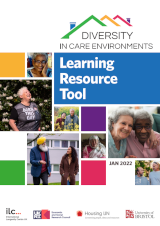 The following four vignettes (short fictional stories) were developed by the DICE team to explore issues of social inclusion and equality in interviews with residents and staff of housing schemes.
The following four vignettes (short fictional stories) were developed by the DICE team to explore issues of social inclusion and equality in interviews with residents and staff of housing schemes.
We present these here as an additional training tool for raising awareness amongst staff and residents about discriminatory attitudes and actions and how to actively address these.
Vignettes
1. Cliff and Sally
Cliff (84) and Sally (80) are a couple who live in a supported housing scheme. They attend almost every social event put on at the scheme. At an event to mark the royal wedding of Prince Harry and Meghan Markle, and in some events since, Cliff and Sally have made comments about Meghan Markle saying that she is ‘polluting the royal blood line’ and that members of the British Royal Family shouldn’t be marrying ‘coloured people’.
Questions to consider:
- How should scheme staff respond if they overheard a conversation like the one above?
- What policies should staff draw upon in order to address this situation?
- What do housing providers need to do to make sure all residents are included and supported? [prompts: training provision; resourcing events and activities; inviting external community groups and services to visit schemes; addressing policy gaps].
2. Phillip’s ‘coming out’
In 2019 Phillip Schofield (a popular TV presenter in his 50s) came out as a gay man to the media. In the scheme where you currently live/ work lots of residents have been discussing this news and you have observed one resident, Bob, making loud comments that he thinks it’s disgusting, especially for a married man, and that ‘those sort of people should keep their gay thoughts and feelings to themselves’. You know there are at least two other people in the scheme who identify as gay and lesbian and you have recently seen one of those residents walking away looking upset after having a conversation in the courtyard with Bob.
Questions to consider:
- What do you think should happen in this scenario?
- How should scheme staff respond if this was reported to them or they witnessed this?
- Is Bob’s behaviour illegal?
- What approach should staff adopt to best address the situation? Or does it need to be escalated to a higher authority?
3. Hayat
Hayat is a 78-year-old Muslim woman who lives in a large extra care scheme. The scheme has a café and restaurant area where some of the residents like to meet to eat lunch together. Prayer is an important part of Hayat’s faith. She performs prayers five times a day. One of these prayers falls at around the same time as lunch time which is the busiest time of the day in the scheme for the staff on site and the estate manager. She would like to join other residents for lunch once she has finished her prayer, however her flat is located some distance from the restaurant. Hayat uses a walking frame and often needs assistance to get from place to place.
Questions to consider:
- How should the scheme manage the mismatch between scheduled mealtimes and Hayat’s prayer routine?
- What could the scheme do to support Hayat? Should the scheme provide her with more support for prayers? If not, why not?
- What would help Hayat to be more included where she lives?
4. Lewis
Lewis is an 82-year-old widower who moved into the scheme two years ago after his wife died. Lewis is an ex-rugby player who recently began using a wheelchair. There aren’t many older men in the scheme who share Lewis’s interests and, since he began using a wheelchair, it has been difficult for him to meet up with his friends at his old rugby club which he used to enjoy visiting regularly. Lewis is becoming increasingly isolated and is reluctant to take part in social activities happening in the scheme.
Questions to consider:
- What should staff at Lewis’s scheme do to include him?
- How can staff help Lewis connect with relevant interest groups in the wider community?
- If Lewis was living in your scheme, how accessible would the scheme be to him? What would make it better?
Acknowledgements
The resources on these webpages are based on findings from the Diversity in Care Environments (DICE) research study, conducted by the University of Bristol, in collaboration with the International Longevity Centre-UK (ILC) and The Housing Learning and Improvement Network.
The study and related resources were funded through a research grant from the UK Economic and Social Research Council (UKRI, grant reference ES/R008604/1), January 2019 to January 2022.




